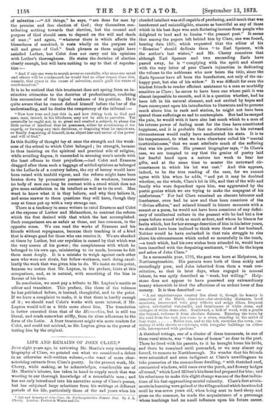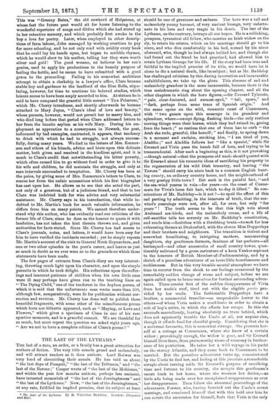LIFE AND REMAINS OF JOHN CLARE.* Jon. eight years ago,
in reviewing Mr. Martin's very interesting biography of Clare, we pointed out what we considered a defect in an otherwise well-written volume,—the want of more char- acterising extracts from Clare's poetry. In the present work, Mr. Cherry, while making, as he acknowledges, considerable use of Mr. Martin's labours, has taken in hand to supply much that was wanting to our thorough knowledge of a remarkable man ; and has not only introduced into his narrative many of Clare's poems, but has subjoined large selections from his writings at different periods of his life, particularly those of the sad years when his
• Life and Remains of John Clare, the Northamptonshire Peasant Poet. By J. L Cherry. London: Frederick Warne and Co.
clouded intellect was still capable of producing, amid much that was incoherent and unintelligible, stanzas as beautiful as any of those which in his best days won such flattering incense from people who delighted to laud and to lionise " the peasant poet." It seems that among the papers left behind him by Clare, one was found, bearing date 1825, which requested that the editor of his " Remains " should dedicate them " to Earl Spencer, with the author's last wishes," and Mr. Cherry conceives that although Earl Spencer and two succeeding Earls have passed away, he is " complying with the spirit and almost with the very letter of poor Clare's injunction in dedicating the volume to the nobleman who now bears the title, since the Earls Spencer have all been the benefactors, not only of the un- happy poet, but also of his widow." It was difficult for even the kindest friends to render efficient assistance to a man so morbidly sensitive as Clare ; he seems to have been one whose path it was almost impossible to smooth, and it is a question whether, had he been left in his natural element, and not excited by hopes and fears consequent upon his introduction to literature and to persons much above him in rank and station, he might not have been spared those sufferings so sad to contemplate. But had he escaped the pain, he would with it have also lost much which to a man of his intense power of feeling must for the time have constituted happiness, and it is probable that no alteration in his outward circumstances would really have ameliorated his state. It is to his temperament, to what we have elsewhere called his " mental inarticulateness," that we must attribute much of the suffering that was his portion. His present biographer says, " In Clare's case, we are tempted to say that the genius of poetry laid her fearful hand upon a nature too weak to bear her gifts, and at the same time to master the untoward cir- cumstances in which his lot was cast." And this appears, indeed, to be the true reading of the case, for we cannot agree with him when he adds, " and yet it may be doubted whether, on the whole, Clare's lot in life, and that of the wife and family who were dependent upon him, was aggravated by the poetic genius which we are trying to make the scapegoat of his misfortunes." For had Clare remained an obscure labourer and limeburner, even had he now and then been conscious of the "divine afflatus," and solaced himself in leisure moments with a sonnet or a poem, he would not have been conscious of any defici- ency of intellectual culture in the peasant wife he had but a few years before wooed with so much ardour, and whom he blames for faults which, but for her strange desertion of him in his latter years, we should have been inclined to think were those of her husband. Neither would he have embarked in that vain struggle to rise above his circumstances which ended so mournfully in the tomb, —a tomb which, had his own wishes been attended to, would have been inscribed with the despairing sentiment, " Here lie the hopes and ashes of John Clare."
In a memorable year, 1793, the poet was born at Helpstone, in Northamptonshire. His parents were both of them sickly and exceedingly poor, and John inherited from them a weak con- stitution, so that in later days, when engaged in manual labour, he was aptly described as " weak, but willing." Help- stone does not appear to have possessed any extraordinary beauty wherewith to bind the affections of an ardent lover of fine scenery. It is thus described :-
" A. not unpicturesque country lies about it though its beauty is somewhat of the Dutch character—far-stretching distances, level meadows, intersected with grey willows and sedgy dikes, frequent spires, substantial watermills, and farmhouses of white stone, and cottages of white stone also. Southward, a belt of wood, with a gentle rise beyond, redeems it from absolute flatness. Entering the town by the road from the east, you come to a cross, standing in the midst of four ways Before you, and to the left, stretches the town, con- sisting of wide streets or roadways, with irregular buildings on either side, interspersed with gardens."
A thatched cottage, one of a cluster of three tenements, in one of these rural streets, was " the home of homes " so dear to the poet. There he lived with his parents, to it he brought home his bride, and there he remained until persuaded, or we may almost say forced, to remove to Northborough. No wonder that his friends were astonished and even indignant at Clare's unwillingness to take possession of the commodious dwelling, " with thatched roof, casemented windows, wild roses over the porch, and flowery hedges all round," which Lord Milton's kindness had prepared for him; and his reluctance to make this slight change was one of the first indica- tions of his fast-approaching mental calamity. Clare's first attain- ments in learning were gained at the village school which he attended until he was seven years old, when being sent to herd sheep and geese on the common, he made the acquaintance of a personage whose teachings had no small influence upon his future career. This was " Granny Bales," the old cowherd of Helpstone, at whose feet the future poet would sit for hours listening to the wonderful repertoire of songs and ditties which she had stored up in her retentive memory, and which probably first awoke in the boy a love for poetry. Later, when employed in other descrip- tions of farm labour, John managed by working overtime to pay for more schooling, and he not only read with avidity every book that he could lay his hands upon, but began to scribble rhymes, which he would show to his mother, telling her they were worth silver and gold! The good woman, no believer in her son's genius, used to apply his productions to the homely purpose of boiling the kettle, and he seems to have submitted with a good grace to the proceeding. Failing in his somewhat ambitious attempt to obtain a clerkship in a lawyer's office, Clare became stable boy and gardener to the landlord of the Blue Bells, stipu- lating, however, for time to continue his beloved studies, which leisure seems to have been amply accorded to him. At sixteen he is said to have composed the graceful little sonnet "To a Primrose," which Mr. Cherry introduces, and shortly afterwards he became attached to Mary Joyce, " Clare's ideal of love and beauty," whose parents, however, would not permit her to marry him, and who died long before that period when Clare addressed letters to her from the lunatic asylum as his wife Mary. During his em- ployment as apprentice to a nurseryman in Newark, the poet, influenced by bad examples, contracted, it appears, that tendency to drink with which he bad to struggle, not always success- fully, during many years. We find in the letters of Mrs. Emmer- son and others of his friends, advice and hints upon this delicate 'matter, both given and received in the kindliest spirit, and it is much to Clare's credit that notwithstanding his bitter poverty, which often caused him to go without food in order to give it to his wife and children, he did maintain the struggle, and only at rare intervals succumbed to temptation. Mr. Cherry has been at the pains, by giving some of Mrs. Emmerson's letters to Clare, to rescue her from the unfair accusations which his first biographer has cast upon her. He allows us to see that she acted the part, not only of a generous, but of a judicious friend, and that to her Clare was indebted both for wise advice and very substantial assistance. Mr. Cherry says in his introduction, that while in- debted to Mr. Martin's book for much valuable information, he differs from him on many points. We cannot therefore under- stand why this author, who has evidently read our criticism of the former life of Clare, since he does us the honour to quote it with laudation, has not taken the hint therein thrown out, and given authorities for facts stated. Since Mr. Cherry has had access to Clare's journals, notes, and letters, it would have been easy for him to have verified the incidents recorded ; yet he simply repeats Mr. Martin's account of the visit to General Birch Reynardson, and one or two other episodes in the poet's career, and leaves us just as much in doubt as we ever were as to the grounds on which these statements have been made.
The few pages of extracts from Clare's diary are very interest- ing, throwing much light upon his character, and upon the simple pursuits in which he took delight. His reflections upon the suffer- ings and innocent patience of children when his own little ones were ill may perhaps have given rise to the touching lines on " The Dying Child," one of the tenderest in the Asylum poems, of which it is said that the unfortunate man wrote more than 500, although few, comparatively, were fit for publication without cor- rection and revision. Mr. Cherry has done well to publish these beautiful fragments, with some other of the miscellaneous poems which have not hitherto appeared, such as "haying, or Love and Flowers," which gives a specimen of Clare in one of his rare sportive moments, and is a graceful conceit. We are thankful for so much, but must repeat the question we asked eight years ago, " Are we not to have a complete edition of Clare's poems ? "































 Previous page
Previous page